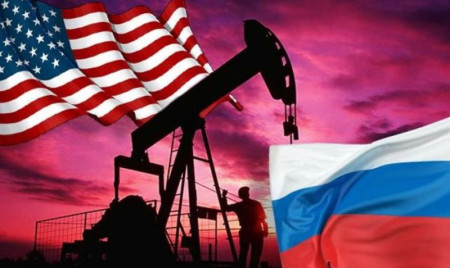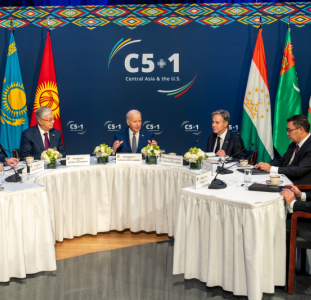
Washington presented a "gift" to Moscow on June 12 when it celebrated Russia Day as the US Treasury once again expanded blocking sanctions against the Russian fuel and energy sector. And the roster is truly mile-long. Thus, the SDN-List now includes all the future NOVATEK projects, LNG tankers abuilding at the Zvezda shipyard for fuel transportation from Arctic LNG 2, as well as Coalstar and Elga coal groups.
Earlier, US restrictions embraced NOVATEK's Arctic LNG 2 project that is under construction for the time being, with its first line already commissioned with an annual capacity of 6.6 million tons. Because of sanctions, the company has not started shipping, given that NOVATEK is yet to obtain six Arc7 LNG tankers from the South Korean Hanwha Ocean shipyard, among other things. Now 7 out of 15 Arc7 tankers under construction at the Zvezda shipyard — the Alexey Kosygin, the Pyotr Stolypin, the Sergei Witte, and another four unnamed methane carriers — have been sanctioned directly. Moreover, another two NOVATEK structures are now sanctioned — NOVATEK LNG Fuel Kashira and Murmansk-Transgaz.
The new round of restrictions affected PJSC Gazprom’s interests, too: the list includes Rusgazdobycha, which, as part of its joint venture with RusKhimAlliance, is building Russia’s largest gas processing and liquefaction complex in Ust-Luga (a project worth some 3 trillion rubles, with its first stage set to be launched in 2026). Last week, Gazprom CEO Alexey Miller paid a personal visit to the construction site.
With RusKhimAlliance already on the SDN-List, June 12 saw US authorities augment it with company head Kirill Seleznev. The Ust-Luga project itself is not mentioned at all.
Now, Gazprom Invest has found itself under sanctions as well, since the US Treasury classifies it as an organization "designing and building gas industry facilities."
By means of sanctions, the American authorities are busy clearing up the way for their own gas, seeking to suppress the Russian Federation as its "niche" competitor. Obviously, development dynamics of Russia’s LNG segment is going to slow down. The fear is that the list soon expands to embrace NOVATEK's Yamal LNG project in operation.
But so far, according to the Kommersant newspaper, Russian LNG exports grew by 3.8 percent on a year-to-year basis in January to May, reaching 14.47 million tons. In May alone, shipments also increased by 3.8 percent to 2.8 million tons. NOVATEK's Yamal LNG plant has started using four new conventional tankers for transshipment in Europe and Asia — North Air, North Mountain, North Sky, and North Way. Initially, the gas carriers might have been ordered for the sanctioned Arctic LNG 2 project, but due the plant’s inability to kick off supplies, they were regrouped to Yamal LNG. Analysts deem the tankers able to backstop the NOVATEK project in case of a ban on LNG transshipment in EU ports discussed as part of the 14th sanctions package.
The Europeans, who usually rush to “comp” the United States right away, are now "making their play" with a backlog: permanent representatives of the 27 EU countries were to agree on the 14th package of anti-Russian sanctions before the Swiss conference on Ukraine. But they failed to reach a deal over Germany's stance, sources told Reuters. The fact of Germany’s blocking negotiations was previously reported by the DPA agency. The next ambassadorial meeting is scheduled for June 19.
European bureaucrats have been debating new anti-Russian moves for over a month. This refers to a ban on transshipment of Russian liquefied natural gas (LNG) in local ports, and introduction of European companies’ liability for violating sanctions by subsidiaries or partners in third countries. Also, ships that have somehow contributed to Russia's military actions may be prohibited from entering EU ports.
An obvious thing is that the next package will get eventually accepted, though with certain mitigations/exceptions when finalized. The German authorities do assess the potential of alternative resource supply opportunities as mediocre, and apprehend risks of a weaker national energy security after new restrictions against Russian fossil fuels come into force. And they do assess the boomerang effect for their country’s businesses from expanding sanctions against the Russian Federation in general.
Apart from that, leaders of the G7 countries plan to arrange for tougher measures to comply with their invented "price cap" for Russian oil. A report to that effect came on June 14 by Bloomberg with reference to a document it got at its disposal. And British Foreign Minister David Cameron told Corriere della Sera that G7 would seek to track the Russian "shadow" fleet of oil tankers, blocking its movements. And on June 13, London expanded the list of anti-Russian sanctions, having actually copied the American one.
Meanwhile, the Russian Federation has been promptly responding to the West with counter-sanctions. On June 13, Russian President Vladimir Putin signed a decree to extend special economic measures for the sale of Russian oil and petrochemicals until December 31. The document prohibits fuel exports if a contract contains price cap terms of $60 per barrel. The document first entered into force on February 1, 2023 as a response to the decision reached by the G7 countries and the European Union to introduce a ceiling on Russian oil prices.









